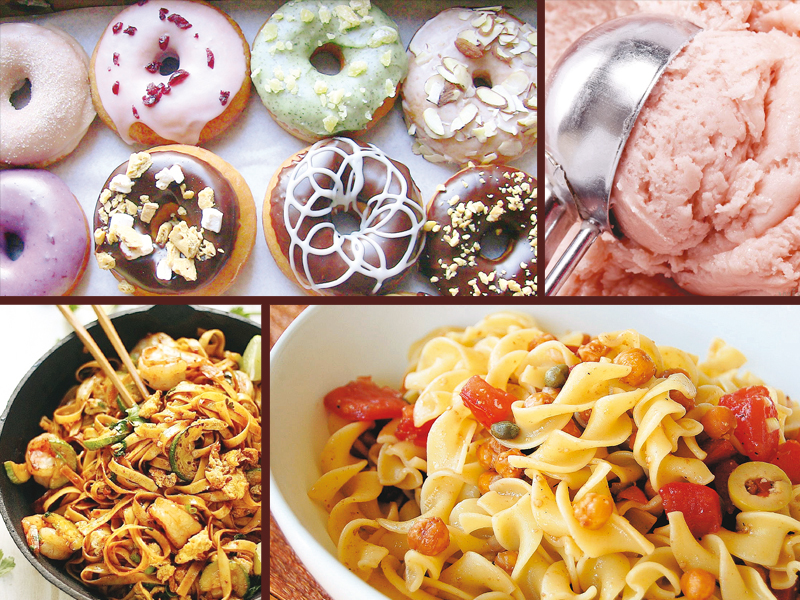
Pasta

According to a new study published in the journal Brain, Behaviour and Immunity, women who consumed refined grains, such as pasta, twice a week were 29 to 41 per cent more likely to be diagnosed or treated for depression than those who stuck to a healthier diet. Blood tests revealed that women who ate the Italian favourite also tested significantly higher for three biomarkers of inflammation that give rise to depression. Although healthy amounts of inflammation are necessary to help your body fight off disease, recent studies have linked out-of-control inflammation caused by consuming too much pasta to ailments, ranging from panic attacks to heart disease.
Chinese cuisines

Kung Pao shrimp and chicken chowmein may make you salivate but they’re not all that great for your emotions. The excess sodium in these greasy, carb-heavy entrées delivers more anxiety and blub than bliss. Dr Michel Lucas of the Harvard School of Public Health says that consuming Chinese foods on a regular basis can disrupt the neurological system, contributing to depression, and can muck up your immune system response, causing feeling of fatigue. Too much sodium in these foods also leads to fluid retention and bloating.
French fries

This global comfort food is a little more than greasy fat, salts, carbs, and a load full of saturated fats, which research has linked to higher rates of depression as well as stomach flab. This most-wanted side snack is prepared by deep frying in hydrogenated oils that contain toxic trans fats, which contribute to feelings of depression. Not only do they bring you down emotionally by clogging arteries and preventing blood flow to the brain but also add inches to your waistline.
Coffee

According to health experts, even a modest amount of caffeine in coffee can contribute to depression and anxiety. Caffeinated coffee disrupts sleep patterns, making it more difficult to fall asleep and stay asleep. Sleep disturbances affect mood and hinder dopamine activity in the brain, thus upping the risk of depression. If that wasn’t enough, it can cause agitation, tremors, and nervousness. Energy drinks, too, are bad news, so ditch those and try converting to decaffeinated coffee or reduce intake to half a caffeinated cuppa a day.
Ice cream

We’ve all got that tub of chocolate ice cream at the back of the freezer, sneaking it out at the end of a bad day. “People soothe stress with foods and those that trigger the reward centres in the brain most effectively are fatty and sweet,” explains Columbia University psychiatrist Dr Drew Ramsey. Sadly, the sugar in the frozen delight spikes your levels of glucose and cortisol, a stress hormone that is responsible for making you feel apprehensive and dejected. Plus, if you overdo the scoops, the lactose in ice cream causes gastrointestinal-tract distress.
Baked desserts

Baked confections, such as doughnuts, cupcakes, brownies and pies, increase anxiety, says Dr Ramsey. That’s because glucose levels in blood sky-rocket without fibre to slow digestion of all that sugar, which, in turn, facilitates the secretion of stress hormones. According to Phylis Balch, a certified nutritional consultant, sugary baked goodies block the production of serotonin, a neurotransmitter that is involved in the regulation of mood, resulting in symptoms, including fretfulness, depression and insomnia. Contrarily, anti-oxidants in dark chocolate promote the release of feel-good hormones; so, next time you’re gloomy, stick to plain old dark chocolate.
Published in The Express Tribune, January 20th, 2015.
Like Life & Style on Facebook, follow @ETLifeandStyle on Twitter for the latest in fashion, gossip and entertainment.
COMMENTS (7)
Comments are moderated and generally will be posted if they are on-topic and not abusive.
For more information, please see our Comments FAQ





1731843133-0/Express-Tribune-(5)1731843133-0-270x192.webp)
1731835314-0/Express-Tribune-(3)1731835314-0-270x192.webp)
1731831463-0/Untitled-design-(19)1731831463-0-270x192.webp)
1731829827-0/Untitled-design-(15)1731829827-0-270x192.webp)








guess there's no hope for me!
So what are we left with and what should we eat? Grass?
I think giving up all these foods would definitely give me depression :)
Now that WAS funniee.